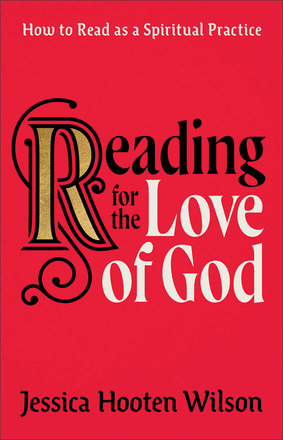Reading for the Love of God
Jessica Hooten Wilson (Brazos Press, $30.99, 193 pages)
 Jessica Hooten Wilson’s Reading for the Love of God: How to Read as a Spiritual Practice laments that Christians stopped “being considered a bookish people – a people who revered words,” to eschew history, philosophy, and literature as they are focused solely on the Word of God. She writes, “in every experience of reading a text, there are three elements: the author, the reader, and the text,” or ART. She emphasizes that “when we interpret” an author’s work, it is distinct from initially reading the book. Doing so involves not only contemplation but perhaps further reading (biographies, criticism) to understand authorial intent, background or other factors that might influence what he or she writes, and it is in the interpretation, not the reading, that we must consider the author’s “stance toward faith.” Echoing Louis Markos, Hooten Wilson argues that pagans and other non-Christians may provide partial truths (he had in mind Homer and Plato, among other ancients), but as readers we must be aware of the author’s worldview. Ultimately, she argues, when we read a book we must ask ourselves: “Can you live it? Can you put it into action? Can you speak – or adapt the language of this work, use it to talk to both yourself and others so as to live better?” This is much more deliberate than the osmosis-like adoption of other’s (albert fictional) experience encouraged by Joseph Epstein (see “Why read,” p. 10), but in certain circumstances is the more penetrating and useful way to read.
Jessica Hooten Wilson’s Reading for the Love of God: How to Read as a Spiritual Practice laments that Christians stopped “being considered a bookish people – a people who revered words,” to eschew history, philosophy, and literature as they are focused solely on the Word of God. She writes, “in every experience of reading a text, there are three elements: the author, the reader, and the text,” or ART. She emphasizes that “when we interpret” an author’s work, it is distinct from initially reading the book. Doing so involves not only contemplation but perhaps further reading (biographies, criticism) to understand authorial intent, background or other factors that might influence what he or she writes, and it is in the interpretation, not the reading, that we must consider the author’s “stance toward faith.” Echoing Louis Markos, Hooten Wilson argues that pagans and other non-Christians may provide partial truths (he had in mind Homer and Plato, among other ancients), but as readers we must be aware of the author’s worldview. Ultimately, she argues, when we read a book we must ask ourselves: “Can you live it? Can you put it into action? Can you speak – or adapt the language of this work, use it to talk to both yourself and others so as to live better?” This is much more deliberate than the osmosis-like adoption of other’s (albert fictional) experience encouraged by Joseph Epstein (see “Why read,” p. 10), but in certain circumstances is the more penetrating and useful way to read.




